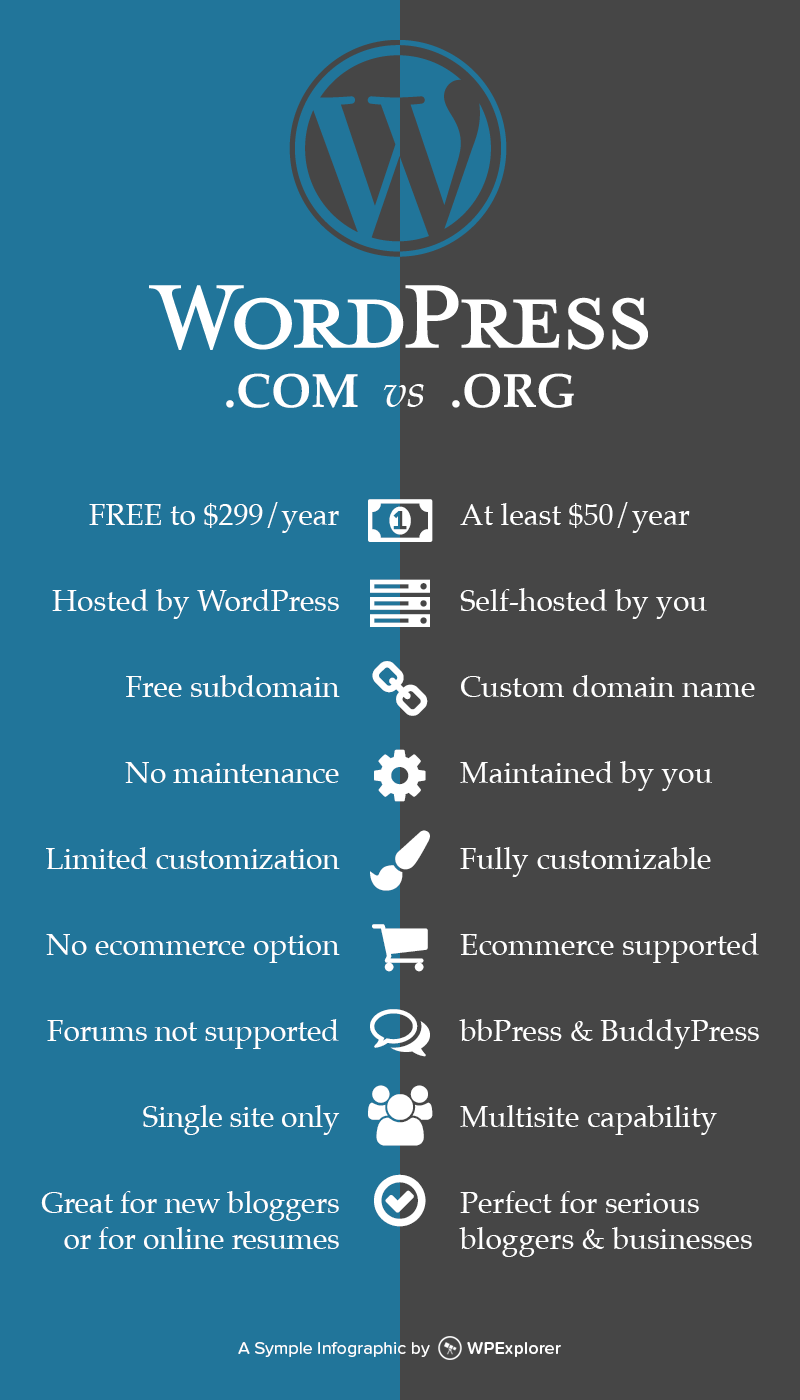WordPress.org VS WordPress.com (Who Wins)
One of the first things that confuse a new WordPress user is to distinguish between WordPress.org and WordPress.com. As a blogger, I myself noticed that the very first question asked by a novice user wants answer of. One often confuses one with the others, which, in fact, is totally wrong considering the fact that the said entities are completely different things. They sure are similar, functionality of the two is similar in many ways, but that certainly doesn’t mean they’re related or same.
So, our team decided to write this guide about what are the things that makes wordpress.org different entity from wordpress.com. I am going to discuss the differences, pros and cons between WordPress.org and WordPress.com and tell you everything you need to know to better understand the best option for you, okay?
Are you ready? Let’s see.
WordPress Foundation
The non-profit organization called WordPress Foundation was founded by Matt Mullenweg. Organization’s sole purpose is to support, promote and make sure that the open source WordPress software thrives and is protected. Given organization holds trademarks for WordPress, WordCamp and involved logos. It is important you understand what the organization stands for.
The official site explains how WordPress name, WordCamp and logo can and cannot be used. It governs to make it hard for people to use said trademarks in their products, services and entities, which seek to unfairly profit from or confuse people looking for WordPress software.
What is WordPress.org
WordPress is distributed licensed under GPLv2 from Free Software Foundation. Every copy of the software contains a copy of this license. It is downloaded and installed over a domain name such as softstribe.com. It is more like installing software in PC but for installing WordPress you will need web hosting (reviews) for your domain name first where the software will be stored (just like hard drive storage in PC, fair enough).
So, that’s where wordpress.org ends and here is how you can learn how to install WordPress on domain or in Windows for testing purpose.
Automattic’s WordPress.com
WordPress.com is same as wordpress.org as in working but the difference is that it offers its users to create free blogs online. You can create free WordPress blog (http://example.wordpress.com) for your personal activities where you can post daily blogs about your life, routine. However, you can also add your custom domain name rather than having wordpress.com at the end of your blog. Also, there are fewer features in free WordPress blog i.e., you can install your desired plugins or themes. You will have to stick to what they offer you in FREE mode. You will have to buy these features in paid membership of wordpress.com.
Let’s see pros and cons of WordPress.org and WordPress.com to see which one would be better choice for you.
Pros and Cons of Self-Hosted WordPress.org
Pros
- WordPress.org has all the functionality of WordPress.com
- Mainly, no matter what you want to create you have 100% control and rights to your content
- You have the option for a custom domain name, your choice of hosting plans
- You can install any free or premium WordPress theme or plugin
- If you wanna create small online shop for selling out your products then: WordPress.org is the only option for you.
- Full e-commerce support via free plugins like WooCommerce
- You can build anything with wordpress.org (kinds of sites you can build with WordPress)
Cons
Hard to find cons for what you love and use in everyday routine 😛 but still I have to bring cons right. Maybe, yeah there are a few ones:
- Using WordPress.org on domain + hosting costs money when WordPress itself is free. For example, domain registration and hosting plan can cost you around $50 a year.
- You are responsible for security and maintenance in WordPress.org
- While in WordPress.com, they are responsible for security however not for content creation.
- No official plugin by WordPress.org for Malware scans and even website backups for you
Pros and Cons of (free) WordPress.com
Pros
- It is 100% free
- No cost for hosting or subdomain name (example.wordpress.com) just like blogger.com
- Free themes, site customizer options and 3 GB free space for your content and media
- WordPress.com is also extremely easy to use
- It is like, register, login and starting focusing on content creation (blogging)
- If you want more features go for premium WordPress plans
- Paid plans: range from $2.99 per month up to $24.92 per month for businesses
Cons
- Limitations: Whether it is a free or paid account, you will never have full control over your website.
- WordPress.com owns your content, you have nothing because everything is controlled and maintained on their multi-site
- For full control you will have to invest $5,000/mo WordPress VIP which is custom cloud hosted WordPress
- If you are using WordPress.com, then you are limited to the free and premium themes
- You cannot utilize Google analytics unless you upgrade to premium plan (cost $299+ a year)
- Monetizing your blog costs extra
- For removing WordPress.com’s default ads, you have to upgrade your plan (Or if you don’t, they keep displaying their ads because that covers the cost of your free WordPress account obviously)
- Also, with WordPress.com you can’t create an online store since, e-commerce is not supported.
- Last but not the least, WordPress.com does not support multisite for users. WordPress.com is a giant multisite itself. For those who are trying to creating their own network with multi-author or subdomains/subdirectories with WordPress.com, then it is probably not a good fit.
Who wins?
Here is an infographic by WordPressexplorer on WordPress.com and WordPress.org comparison which will help us figure out who wins.

